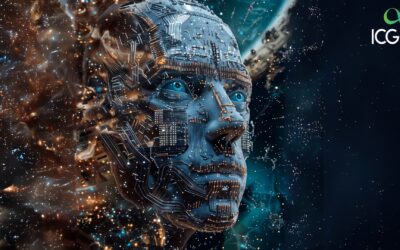n an era defined by rapid technological advancement and evolving business landscapes, the role of internal audit has never been more crucial. As organizations navigate complex regulatory environments and exponential data growth, the need for innovative approaches to audit processes becomes imperative. Enter artificial intelligence (AI), a transformative force poised to redefine the internal audit function and unlock new worlds of efficiency, effectiveness, and insight. In this blog, we’ll explore the core concepts of AI in internal audit and delve into its practical applications, shedding light on how it’s reshaping traditional audit practices and empowering auditors to thrive in today’s dynamic business environment.
Key Concepts of AI in Internal Audit
Machine Learning (ML): Machine Learning is a game-changer in the world of internal audit, enabling us to uncover hidden patterns and anomalies that may indicate potential risks or fraudulent activities. By training algorithms on historical data, ML algorithms can analyze vast datasets with superhuman speed and accuracy, identifying irregularities that may have gone unnoticed through traditional audit methods. Imagine being able to analyze every single financial transaction in your organization, rather than relying on sampling techniques. With ML, this is no longer a pipe dream. By leveraging the power of ML, internal auditors can focus their efforts on high-risk areas, optimizing resource allocation and enhancing the overall effectiveness of audit processes.
Natural Language Processing (NLP): Natural language processing (NLP) equips machines with the ability to understand and interpret human language, enabling auditors to analyze unstructured data sources such as emails, reports, and regulatory documents. NLP algorithms parse through textual data, extracting valuable insights and identifying compliance issues or potential risks buried within vast troves of information. By harnessing NLP, auditors can gain deeper insights into organizational operations and uncover hidden risks that may go unnoticed through traditional audit methods.
Robotic Process Automation (RPA): One of the most time-consuming and tedious aspects of internal audit is the collection, validation, and reporting of data. These routine tasks, while necessary, can often divert valuable resources away from higher-value activities that require critical thinking and analysis. Robotic Process Automation (RPA) offers a solution to this challenge by automating repetitive tasks, freeing up auditors to focus on more complex issues. By leveraging RPA, internal audit functions can streamline processes, reduce the risk of human error, and improve overall efficiency. Imagine being able to generate audit reports with the click of a button, or automatically reconcile financial data across multiple systems. With RPA, these scenarios are no longer a dream, but a reality that is transforming the way we approach internal audit.
Predictive Analytics: In the fast-paced world of business, anticipating risks and adapting to changing conditions is crucial for organizational success. However, traditional audit methods often rely on historical data and reactive approaches, making it challenging to stay ahead of emerging threats.Predictive Analytics, powered by AI, offers a solution to this challenge by enabling internal auditors to forecast future risks and outcomes based on historical data. By leveraging advanced algorithms and machine learning techniques, Predictive Analytics can identify patterns and trends that may indicate potential issues before they even occur. This proactive approach allows internal audit functions to optimize resource allocation, enhance decision-making, and deliver greater value to their organizations.
Practical Applications of AI in Internal Audit
Automating Routine Tasks: As mentioned earlier, one of the key benefits of AI in internal audit is the ability to automate routine tasks, freeing up auditors to focus on more strategic initiatives. By leveraging RPA, internal audit functions can streamline data collection, validation, and reporting processes, reducing the time and effort required for these mundane tasks. But the benefits of automation go beyond just saving time. By eliminating manual errors and ensuring consistency in data processing, RPA enhances the accuracy and reliability of audit findings. This, in turn, leads to more informed decision-making and better outcomes for the organization as a whole.
Enhancing Risk Assessment: Risk assessment is a critical component of internal audit, and AI offers powerful tools to enhance this process. By leveraging ML algorithms, internal auditors can analyze vast datasets to identify unusual patterns or anomalies that may indicate potential risks or fraudulent activities. Imagine being able to detect a needle in a haystack, but on a much larger scale. That’s the power of AI-driven risk assessment. By diving deep into complex data sets, internal auditors can uncover hidden insights and make more informed decisions about where to focus their efforts. This proactive approach not only strengthens risk management practices but also enhances the overall effectiveness of audit processes.
Continuous Auditing: Today, organizations need to be agile and responsive to emerging risks and opportunities. Traditional audit methods, with their periodic reviews and lengthy reporting cycles, often struggle to keep up with the pace of change.AI-powered continuous auditing offers a solution to this challenge by enabling real-time monitoring of transactions and processes. By implementing continuous auditing practices, organizations can promptly address anomalies and deviations, minimizing risks and ensuring compliance with internal controls. This enhanced agility not only improves risk management but also enables organizations to seize opportunities more quickly and effectively.
Improving Audit Quality: At the heart of every successful internal audit function is the delivery of reliable and actionable insights that drive organizational success. However, achieving this goal can be challenging, especially when dealing with large and complex datasets. AI offers a solution to this challenge by enabling internal auditors to analyze entire datasets rather than relying on sampling methods. By leveraging advanced analytics techniques, AI can uncover hidden patterns, trends, and anomalies that may have gone unnoticed through traditional audit methods. This comprehensive approach enhances the thoroughness and accuracy of audits, leading to more reliable and actionable findings that drive real business impact.
Regulatory Compliance: Ensuring compliance with ever-changing rules and regulations is a constant challenge for organizations. Non-compliance can lead to hefty fines, reputational damage, and even legal consequences, making it a critical priority for internal audit functions. AI offers a powerful tool for enhancing regulatory compliance by continuously monitoring and analyzing data against regulatory requirements. By leveraging advanced analytics techniques, AI can detect potential compliance issues in real-time, enabling organizations to address them promptly and mitigate the risk of non-compliance. This proactive approach not only reduces the risk of penalties but also enhances the organization’s reputation as a responsible and ethical player in the market.
In conclusion, the integration of AI in internal audit is a game-changer that has the potential to transform the way we approach this critical function. By leveraging the power of Machine Learning, Natural Language Processing, Robotic Process Automation, and Predictive Analytics, internal auditors can streamline processes, enhance risk assessment, and improve overall audit quality.
The ICG Approach
At ICG, we harness the power of AI to create new and better experiences and services for you and your customers, using state-of-the-art techniques such as deep learning and neural networks as well as traditional machine learning.With our help you can generate more value by leaving digital solutions to carry out repetitive operational tasks, especially when RPA solutions are combined with artificial intelligence and big data.
Ready to talk?
Request your free Consultation to learn more about ICG’s capabilities and enablement to embark on a transformative expedition toward the summit of success.









